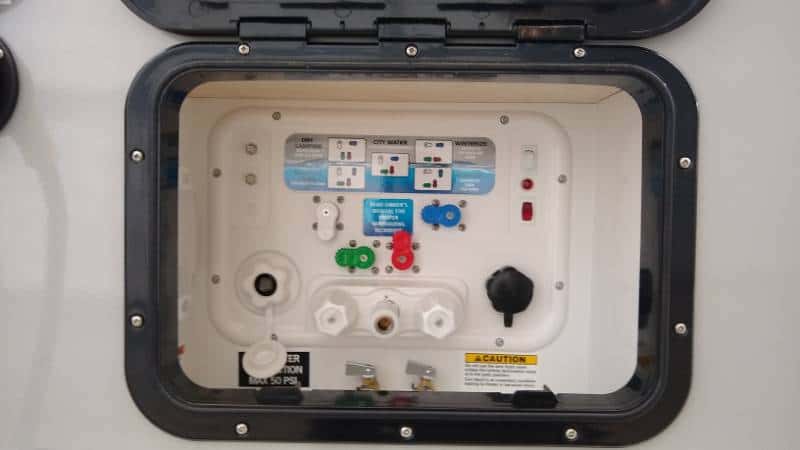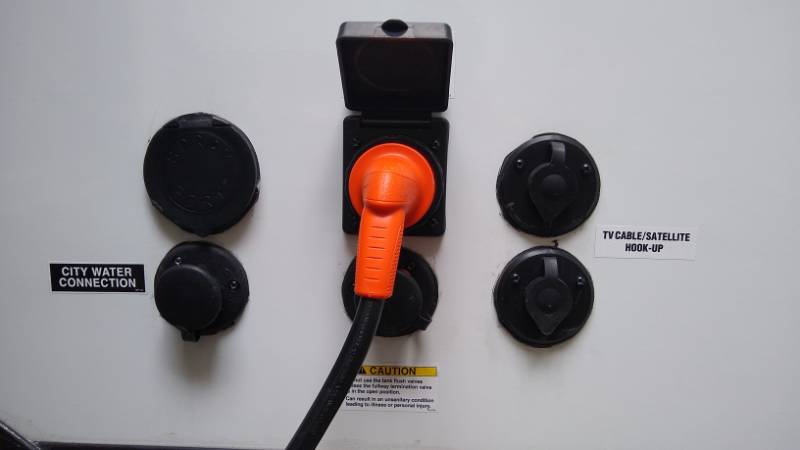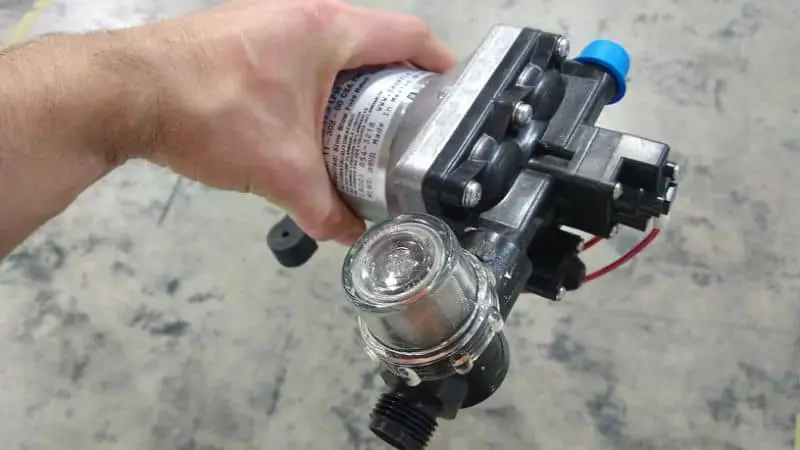A common question from new RVers is whether you should leave your water turned on when you’re away from your campsite. I think you shouldn’t. And here’s why.
RV Water Supply System 101
First of all, your RV has two sources of water:
- An onboard freshwater tank,
- And a city water hookup.
If you have a simple RV, you probably connect to city water using a simple water inlet like this (see below). And you use a larger water inlet, like this (see below), for filling up your freshwater tank with a freshwater hose with garden-hose threads.
If you have a larger RV, you may have a Nautilus water system with a diverter valve that can fill up the freshwater tank with the city water. When the tank is full, the diverter valve must be closed to avoid
overfilling and overpressurizing the tank.


Introduction to Your City Water Hookup
It’s important to realize that your city water is pressurized! Your municipality pressurizes the water supply with pumps or a water tower. By the time water reaches your RV at a campsite, it’s usually 30-65 psi at the campground hookup.
Technically, new RVs are rated for at least 80 psi. However, what works on paper doesn’t always work in reality – especially after a few years of use. So most savvy RVers use an inline water pressure regulator to reduce incoming water pressure to 40-50 psi. These regulators both protect from sustained high pressure and from momentary pressure spikes, which can be just as damaging.
When connected to city water, all the pressure is provided by the municipality. You can’t turn it off. So long as the city water hose is connected to your city water inlet, your system is being pressurized.
Introduction to your Freshwater Tank and Water Pump
However, your freshwater tank is NOT pressurized! (A pressurized freshwater tank would soon rupture or explode). Instead, a water pump draws water from the tank and pressurizes it for delivery to your faucets, toilets, showers, etc.

Here’s what you should realize about your water pump: It’s based on demand. It “looks” for low pressure. When your water pressure drops – such as when you open a faucet – the pump turns on. When water pressure increases – such as when you close a faucet – the pump turns off. That’s how it “thinks.”
The pump is powered by 12V DC electricity. When you’re plugged into shore power, this DC electricity is coming from your converter. When you’re not plugged in, this DC electricity is coming from your house batteries.
Now, let’s go back to the question: Should you disconnect water when you’re away from your RV?
I say yes.
What About a Water Leak?
What if your RV springs a leak while you’re gone?
If you’re connected to city water – well, the city doesn’t know you have a leak! The water stays pressurized. The leak keeps leaking. By the time you’ve returned, your entire sink/cabinet/floor could be soaked! (I’m not exaggerating. I’ve seen this happen.)
If you’re relying on a water pump – well, you face a similar problem. The water pump isn’t clairvoyant; it only knows pressure. A leak results in low pressure, so your pump turns on. And it’ll stay on, pumping water through the leak, until it has drained your entire freshwater tank (and possibly burning itself up in the process).
Make This Easy On Yourself!
If you’re thinking to yourself that it sounds like a hassle to physically disconnect your water hose every time you leave the RV … I’m not suggesting that at all! (and yes, it would be).
Just follow two rules:
- If you’re relying on your water pump, simply switch off 12V power to the pump. Every RV has a rocker switch to the water pump, usually located on the main control panel.
- If you’re relying on city water, then do yourself a favor and install a garden hose shut-off valve to one end of your hose. Then, simply close the valve to turn off the flow. No need to unscrew the threaded hose connections.
No leaks; no problems! That’s why you should always turn off the water when away from the campsite.
Leave a Reply